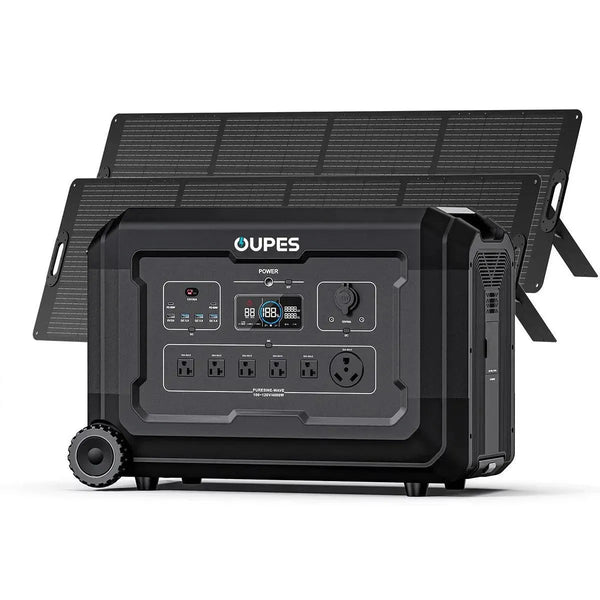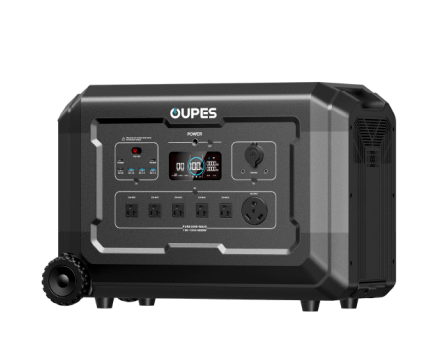
TL;DR / Key Takeaways
- CPAP machines require consistent, reliable power to support uninterrupted sleep therapy.
- Portable power stations are safer, quieter, and more versatile than fuel generators for medical devices.
- OUPES Exodus and Mega series offer excellent options depending on your lifestyle, capacity needs, and mobility.
- Key features to consider: battery capacity, AC output, runtime, portability, and safety certifications.
Why CPAP Users Need a Portable Power Station
For people managing sleep apnea, a Continuous Positive Airway Pressure (CPAP) machine is not just a convenience—it’s a necessity. CPAP therapy ensures steady airflow during sleep, preventing interruptions that can lead to fatigue, cardiovascular issues, and other health risks. But what happens when the power goes out, or when traveling to places without reliable electricity?
Portable power stations offer a reliable backup. Unlike noisy fuel generators, they are safe to use indoors, produce no fumes, and operate quietly— essential qualities when powering sensitive medical equipment overnight. They also provide peace of mind during natural disasters, long camping trips, or while living off-grid.
OUPES power stations are designed to meet these needs, delivering clean, stable energy through AC outlets and offering multiple charging methods to keep your CPAP machine running no matter the situation.
Key Features to Consider When Choosing a CPAP Power Solution
Not every portable power station is suitable for medical devices. For CPAP users, there are several critical factors to consider when evaluating options:
- Battery Capacity: CPAP machines typically use 30–60 watts. A station with 500–1000Wh capacity can comfortably power a CPAP for multiple nights.
- AC Output Power: The station must provide stable AC output to prevent interruptions. Look for units with at least 300–600W continuous output.
- Runtime: Consider how long you’ll need to run the machine. For extended outages, larger models like the OUPES Mega 2 or Mega 3 offer peace of mind.
- Noise Level: Quiet operation is crucial for uninterrupted sleep. Battery-powered stations like OUPES operate silently compared to fuel generators.
- Safety: Medical devices require consistent power. LiFePO4 battery chemistry and advanced BMS (Battery Management Systems) in OUPES models ensure stability.
Additionally, portability may play a role. A lightweight unit is convenient for travel, while larger models are better suited for long-term home backup.
Comparing OUPES Power Stations for CPAP Machines
OUPES offers a range of power stations in its Exodus and Mega series that are suitable for CPAP usage. Below is a comparison to help you match the right model with your needs:
| Model | Capacity | AC Output | Estimated CPAP Runtime* | Best Use Case |
|---|---|---|---|---|
| Exodus 600 | 256Wh | 600W | ~4–6 hours | Short trips, emergency overnight use |
| Exodus 1200 | 992Wh | 1200W | ~2–3 nights | Travel, moderate outages |
| Mega 1 | 1024Wh | 2000W | ~2–3 nights | Home backup, RV trips |
| Mega 2 | 2048Wh | 2500W | ~4–5 nights | Extended outages, off-grid use |
| Mega 3 | 3072Wh | 3600W | ~1 week | Whole-home backup, long trips |
*Runtime estimates vary based on CPAP settings, humidifier use, and additional devices connected.
This comparison shows that smaller units like the Exodus 600 provide short-term solutions, while larger models in the Mega series ensure uninterrupted therapy during long power outages or extended travel.
Best Scenarios for Using OUPES Power Stations with CPAP
Different situations call for different backup solutions. For occasional travelers or campers, a lightweight unit like the OUPES Exodus 1200 is often sufficient. It balances portability with enough capacity to power a CPAP for several nights without frequent recharging.
For families living in areas prone to hurricanes, wildfires, or extended blackouts, larger models like the Mega 2 or Mega 3 are better suited. These not only run CPAP machines but also support refrigerators, fans, and lighting—ensuring comfort and safety during emergencies.
For RV users or long-term off-grid living, the OUPES Mega 5 stands out with its massive 5040Wh capacity, expandable up to 45.36kWh. This scalability means you can keep CPAP therapy consistent while powering multiple appliances, truly creating an off-grid lifestyle without compromise.
No matter the scenario, OUPES offers a tailored option to ensure CPAP therapy is never interrupted, keeping health and comfort a top priority.
FAQs
Can I safely run my CPAP machine on a portable power station?
Yes. OUPES power stations provide pure sine wave output, ensuring stable electricity for sensitive medical devices like CPAP machines.
How long can an OUPES station run a CPAP?
Depending on the model, runtimes range from a few hours (Exodus 600) to nearly a week (Mega 3). Larger stations are best for extended outages.
Can I use solar panels to recharge while running my CPAP?
Absolutely. OUPES stations are compatible with solar charging, making them ideal for off-grid living or multi-day power outages.
Is it safe to use a portable power station indoors?
Yes. Unlike gas generators, OUPES stations are emission-free and silent, making them perfectly safe for bedrooms and living spaces.
Conclusion
For CPAP users, having reliable backup power isn’t optional—it’s a matter of health and well-being. Portable power stations provide a safe, quiet, and versatile solution for ensuring uninterrupted therapy in any setting.
With a wide range of options, from the compact Exodus 600 to the expandable Mega 5, OUPES portable power stations are designed to meet diverse needs. Whether you’re preparing for a short trip, facing prolonged outages, or living off-grid, OUPES delivers the peace of mind and performance required to keep CPAP therapy running smoothly.




























